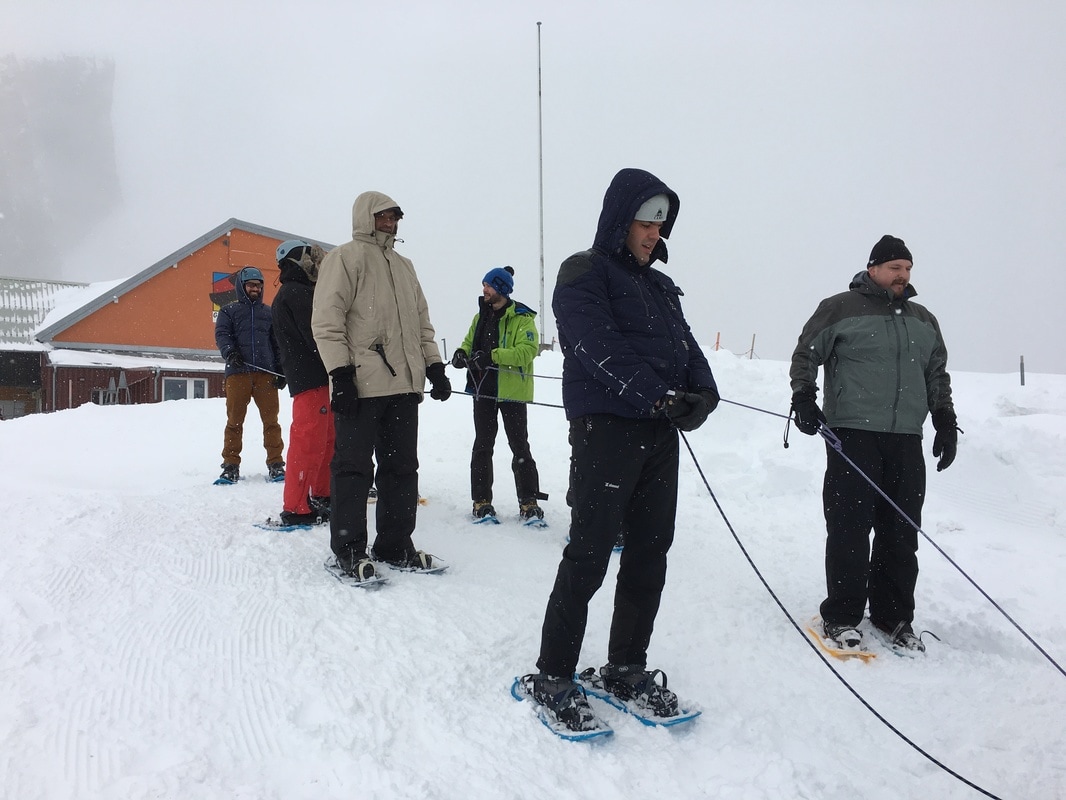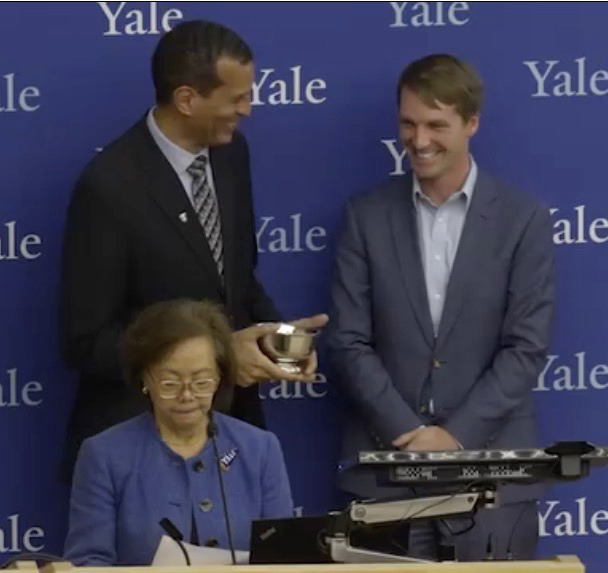There is nothing more practical than good theory
|
(Gemmi Pass, Switzerland) Reaching the summit at GEMMI was an indulgence, an act of rebellion, and extreme political act. While there, I was able to reflect about my own identity as a leader along my peers from the Global Leadership Fellowship Programme. What a privilege! And yes, reflection nowadays is a political act that is much need in our world. The mountains, the snow storms, the silent walks and the group exercises: all things provided me with valuable opportunities to intensely reflect on both my personal and group identities.  Running exercises during GEMMI with people I care much about, and playing together ‘in the arena’ under uncommon circumstances that broke down a few, allowed us to abandon the type of violence that politeness causes in many groups. This unhelpful politeness impedes the joint experimentation on how to express our full range of emotions with the proper amount of energy. Particularly, I tend to exert too much of this energy, and many times I need to remind myself of not overreacting. So, while honoring my own experience, we came together to share this safe space and a deep sense of freedom that provided us with a glimpse to more real group interactions, where our stories as global leaders became demystified. GEMMI was indeed a place where you can prove that leading others and self-awareness is a contact sport. I was relieved to find out that other members of my cohort are in the same path as mine. Many of us want to ‘get high’, or do ground-breaking work. We are impatient about it, and we are seeking this experience with urgency. We are restless and desiring the autonomy and ownership for this type of work that we think can be more impactful. Salary conditions are important, but only as a baseline. We leave or stay in our jobs not because of our current conditions or the past, but because of our future prospects. Emotions matter. At GEMMI I found out again that this statement is true even when you share your life with people from different cultures than yours. Or, maybe it is in these situations that emotions matter the most. Our feelings often have layers that usually hide the truth about the impact of our interactions. So, in our safe space in the mountains, we practiced how to peel down these emotional layers to separate the modes of communications that are helpful from those that are unhelpful. For example, ‘feeling frustrated’ turned out to be an unhelpful phrase to use when disclosing emotions, or when providing feedback to others. At GEMMI, my multi-cultural cohort used experimentation in real life human interactions as a key rule of engagement. These interactions were not like those well-contained simulations where you expect to suffer some ‘gotcha moments’. Our interactions were something else. Our coaches facilitated multiple 1-on-1s and group-think exercises to expand our emotional intelligence capacities. And we did the rest and extracted so much learning. In my case, curiosity proved to be the greatest antidote to reduce the natural tensions that were created. Curiosity proved helpful. Unhelpful behaviors that I tried to stop were: to assume my usual roles as a manner of ‘surviving’ my group interactions; to mindfully take the sidelines in group discussions to let others take control; and, to let myself be bored with topics not so relevant to me. The invitation from our coaches to actively engage with others with a ‘now and here’ attitude did result an act of generosity for others. So I practiced how to use my space and how to be present without overreaching or disempowering others. This constant attention to our surroundings is not an easy thing to hold. It can be stressful to us sometimes and it definitely takes a toll over our stamina. Yet I learned, or rather remembered from my Basketball years, that practice makes perfect. Truly engaging with others while receiving or giving feedback was a gift to our group, even if many times these were hard things to do. It is tough to receive feedback, especially when it is somewhat unhelpful. Yet without enough stress, learning stops. Each of us has that sweet spot to find. We only need to be mindful of our personal limits, because too much of it can also dampen learning. The final lesson from GEMMI, as an experience helping me to build my personal theory of interpersonal and group dynamics, was realizing the importance of taking the space you are given in life. When I did not own my space, others occupied it and filled it with assumptions of my motives. In my particular case, since I was given feedback of my strong presence in the group, I noticed that others would interpret my reservations to guide with apprehension, distrust and even fear. My plan to yield my space to others while trying to be a team player was misunderstood and negatively viewed. In the past, I have feared to consume too much airtime in group settings or to be seen as patronizing when leading others. After receiving this Johari’s window feedback, I have found a reason to continue seeking how to regulate myself between the extremes of forcing my leadership and abandoning it. My coach even told me that it was always better to fail on the side of using your leadership. I am called to speak up while empowering others. This is in consonance with my past life story, which I also reviewed with my coach. Intentionally exercising my principled leadership giving a premium to active listening does not mean to be quiet or passive. And it surely does not mean to abandon the arena. I can, in fact, speak up and simultaneously give to others the power of the last word, the power to call their shots. But it takes practice. Experimentation, not perfection, will produce the fluidity that I long for my personal leadership. If I want to improve in using, managing, identifying and understanding emotions, I must be willing to fail along the way. In conclusion, making sense of what happened at GEMMI is easier when I demystify the experience of it. Personal reflections do not need to happen exclusively in such high places. My everyday interactions can make up for an arena where my willingness to experiment and learn with others can bring about the needed insights for my career. Practice will make perfect, or not. Finding and holding ground in these everyday spaces both in my workplace and personal life will surely have the potential to increase my leadership impact.
1 Comment
Maria Urrutia
9/21/2018 04:20:56 pm
Very insightful!
Reply
Leave a Reply. |
AuthorVictor Padilla-Taylor is Director of Networks at the Tsai Center for Innovative Thinking at Yale. He was the 2021 recipient of the Linda Lorimer Award for Distinguished Service, conferred by Yale’s president on staff who have demonstrated their commitment to innovative thinking and the educational and research missions of the university. He also serves as board leader at Global Consortium for Entrepreneurship Centers, Long Wharf Theatre, Yale SOM Alumni Advisory Board, and Saint Thomas More Chapel and Center at Yale University. For his accomplishments as alumni volunteer, he received the 2023 Yale Alumni Leadership Award for his service and innovative leadership as nominated and selected by alumni relations staff members. AlpsBoundA global soul with MBA experience from GNAM schools around the world Archives
October 2023
Categories
All
|

 RSS Feed
RSS Feed